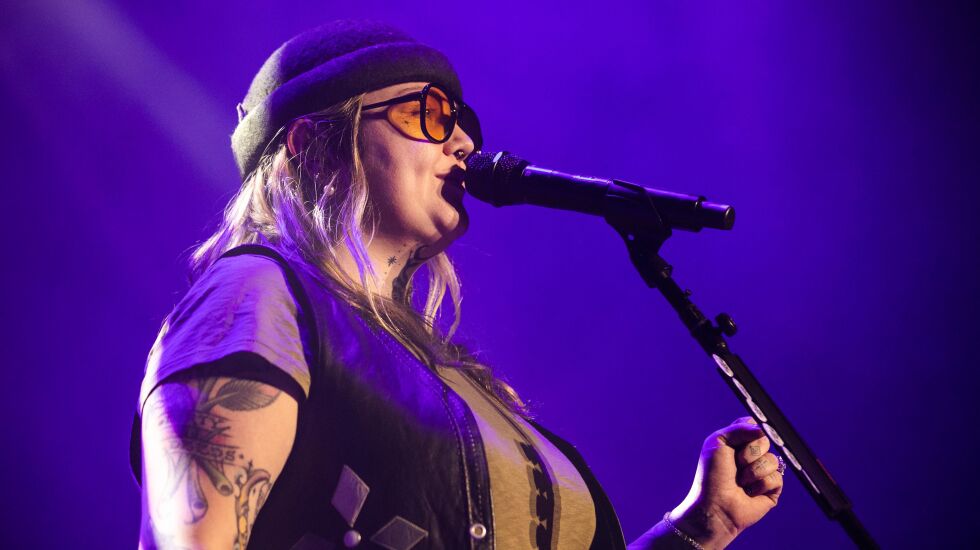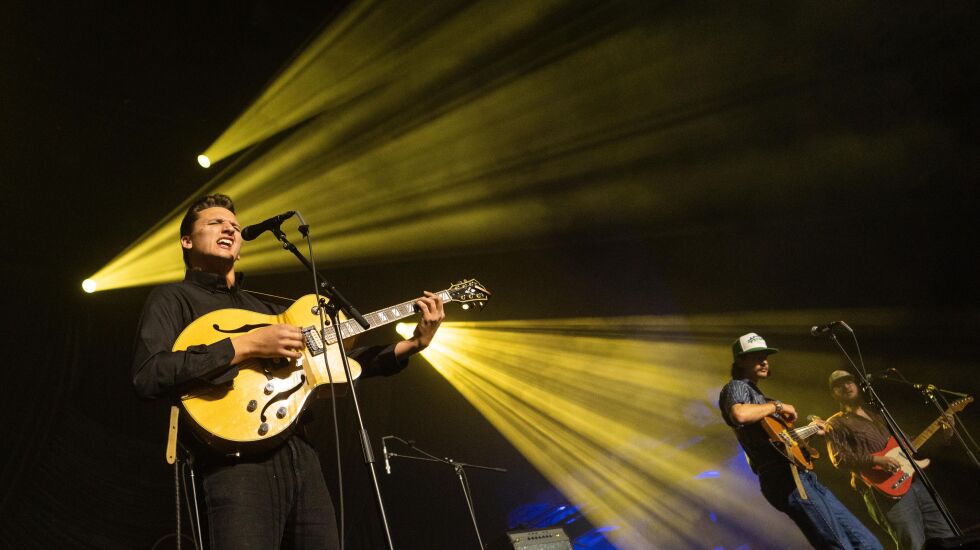
What a difference a year — and a leap into country music — has made for Elle King. Nearly a year ago to the day, she was headlining Metro. By Saturday night, the audience had tripled during the Chicago stop of her A-Freakin-Men tour at the brand-new Salt Shed.
That’s what a No. 1 single with Miranda Lambert can do. Last April, their party anthem “Drunk (And I Don’t Wanna Go Home)” took over the top spot on the Country Airplay Chart, the first time a female duet had done so since 1993, and soon went platinum. King, previously known for her cutthroat pop smash “Ex’s & Oh’s,” took the bait. “Drunk” became the first single for her new album “Come Get Your Wife” (released Jan. 27) as she made a full pivot into the genre with the album’s other 12 tracks, also including a new collaboration with Dierks Bentley, whom she hits the road with this summer.
Country is not new territory for King — not at all. But her full step into the genre — embraced by CMT and Nashville alike — has upped the ante for both the singer and the genre as they both find themselves evolving. As Billboard has shared, King “symbolizes country’s increasing ability, and willingness, to experiment” and does so without sacrificing all she’s built since her 2015 retro blues/folk/rock debut “Love Stuff” — and all the charming attitude that has come with it.
On Saturday night, King made it clear she’s not looking to lose any of that essence. As plumes of vape smoke filled up the stage with all the power of a fog machine, she talked of being “drunk since 4:30” and revealed her fringed biker vest was her attempt at “dressing up.” Even though she’s a bit more country now, the “little bit rock ’n’ roll” is still enshrined in her DNA. It was let out during the 100-minute, 18-song set, whether in song (the sudsy blues rocker “Ain’t Gonna Drown”) or spirit (flipping off the room during “The Let Go”). The other beautiful parts of her musical makeup — from gospel to folk to soul to bluegrass — also were given room to breathe in the performance that laid down at altar of roots music.

After mood-setting intro music courtesy of Nitty Gritty Dirt Band, King and her masterful four-piece backing band on guitar/bass/drum/keys ripped into the foot-stomping, hip-slapper “Tulsa” off “Come Get Your Wife,” quickly followed by the barn-raiser “Good For Nothin’ Woman” and the dive-bar singalong “Chain Smokin, Hard Drinkin, Woman.” If it seems like there’s a theme here, there is. King is another strong woman in the genre breaking down the doors of the boys club by showing she can swig ’em back and light ’em up just like the best of them.
But King also has her soft moments too. She took time to talk about motherhood and her infant son Lucky and broke out stories of growing up in rural Ohio and learning to play banjo early on (a time before her dad, actor Rob Schneider, introduced her to the performing arts in New York City). The banjo was one of her instruments of choice during the show, as was a brand-new mandolin she had just picked up at Chicago Music Exchange earlier in the day. Both added nicely to covers of “I’m Not Drunk I’m Just Drinking” (Mack Allen Smith) and “The Cover of Rolling Stone” (Dr. Hook & the Medicine Show) — when their nuances could be fully heard. At times the muddy, tuned-down acoustics in the new venue left much to be desired and, on a few occasions, prevented King’s vocals from popping where they should have.

King has said in recent interviews that she has felt her most comfortable and vulnerable on her latest material, and it seems the confessional, conversational writing traditions of country music have become a vehicle for her to open up, in turn drawing an audience that gleans to her “everyday woman” nature. It was apparent as she neared the end of the show Saturday night and quieted the band behind her so she could “have a moment” to go full a cappella for the last few verses of “Little Bit of Lovin’.” If there would have been a mic to drop, she would’ve earned it.
The night’s openers, Alabama troubadours Red Clay Strays, were a hearty appetizer, taking cues from the playbooks of Sun Records to inform their rockabilly revival style. Singer Brandon Coleman looked like Johnny Cash but sounded like Nathaniel Rateliff, adding to the unique juncture of sounds created by the strong ensemble, another example of roots music having its moment again.







